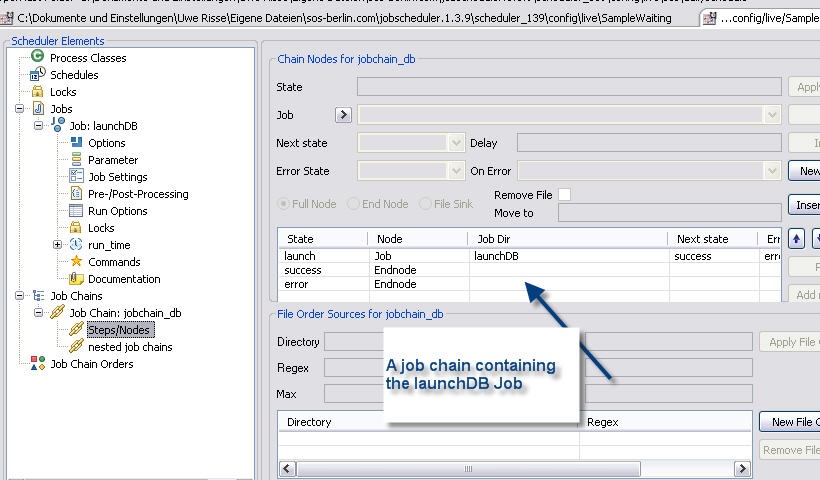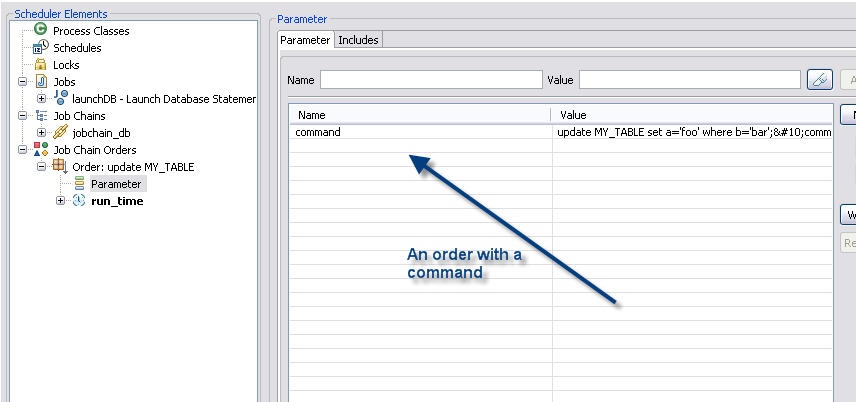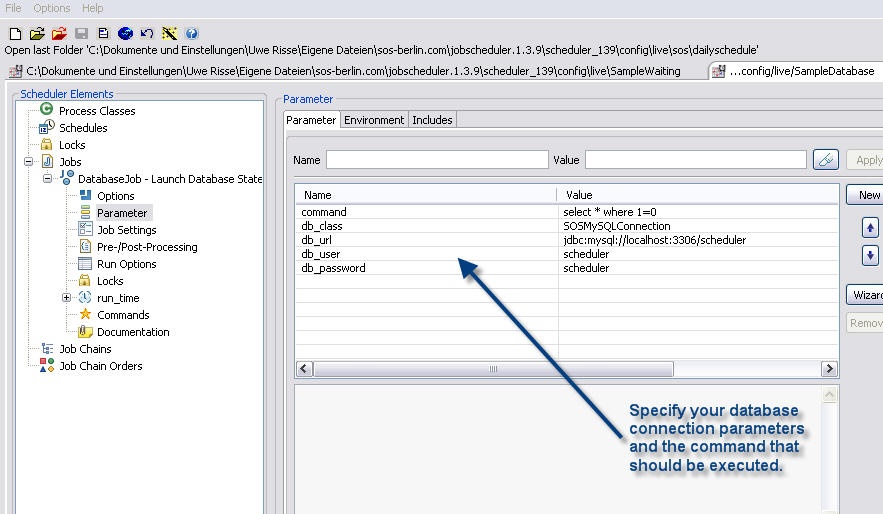| Table of Contents | ||||||||||
|---|---|---|---|---|---|---|---|---|---|---|
|
JITL: The Managed Database Job
| Info | ||
|---|---|---|
| ||
This job uses the deprecated sos.scheduler.managed.JobSchedulerManagedDatabaseJob that has been deprecated with Release 1.12. The JobSchedulerManagedDatabaseJobSOSHibernate job is provided as an alternative. |
This job is used to execute (SQL-)statements in a database and can be used standalone used as a standalone solution or triggered by orders to execute statements in a database.
These can be - i.e. as an order job.
It can execute database procedures or SQL statements.
(A general overview of all JITL jobs can be found Library of Standard Jobs - JITL).
The description JobSchedulerManagedDatabaseJob.xml is stored in the ./jobs directory of your Job Scheduler the JobScheduler installation.
The SQL instructions are written in the command parameter.
It is possible to define more than one instruction in the command parameter.
Such instructions are then carried out in the order in which they are written and must be separated by a semicolon and a subsequent new line.The
Managed Jobs PHP web interface provides a text for this area, while in the Job Scheduler Object Editor (JOE), only one input field is available.
PHP converts the textarea hexadecimal because a newline can not be written in an XML attribute.
If you want to use the job with multiple statements without the MANAGED JOBS, then the statements must be changed hexadecimalYou can use as newline.
The following is an example of a job chain in which the statements are converted before launching.command contains two statements separated by .
The job chain launchDB.job_chain.xml:
| Code Block |
|---|
<job_chain orders_recoverable="yes" visible="yes">
<job_chain_node state="launch" job="launchDB" next_state="success" error_state="error"/>
<job_chain_node state="success"/>
<job_chain_node state="error"/>
</job_chain>
|
The order launchDB,updateMyTable.order.xml:
It contains an update statement and a commit.
| Code Block |
|---|
<order title="update MY_TABLE">
<params>
<param name="command" value="update MY_TABLE set a='foo' where b='bar';&#10;commit;"/>
</params>
<run_time/>
</order>
|
The job launchDB.job.xml (i.e. with a MySQL database connection, examples for other DBMS see below): It executes the statements where the statement in the order command parameter overwrites the statement in the job command parameter.
MySQL (MariaDB)
| Code Block |
|---|
<job title="Launch Database Statement" order="yes" stop_on_error="no">
<description> |
| Code Block |
<[http://www.sos-berlin.com/doc/en/scheduler.doc/xml/job.xml job ] title="Launch Database Statement" order="yes"> <description> <include file="jobs/JobSchedulerManagedManagedDatabaseJobJobSchedulerManagedDatabaseJob.xml" /> </description> <params> </description> <param name="db_class" value="SOSMySQLConnection"/> <params> <param name="db_driver" value="com.mysql.jdbc.Driver"/> <param name="commanddb_url" value="jdbc:mysql://localhost:3306/scheduler"/> value <param name="db_user" /> value="scheduler"/> <param name="databasedb_connectionpassword" value="scheduler" /> <param name="command" value=""/> </params> <param<script namelanguage="java"db java_class="sos.scheduler.managed.JobSchedulerManagedDatabaseJob"/> <run_time/> </job> |
For other database management systems you have to modify the connection parameter like in the following examples:
MS SQL Server
| Code Block |
|---|
<job title="Launch Database Statement" order="yes" stop_on_error="no"> value<description> <include file="jobs/JobSchedulerManagedDatabaseJob.xml" /> </description> <params> <param name="db_driver"class" value="SOSMSSQLConnection"/> <param name="db_driver" value="" /> com.microsoft.sqlserver.jdbc.SQLServerDriver"/> <param name="db_url" value="jdbc:sqlserver://localhost:1433;sendStringParametersAsUnicode=false;selectMethod=cursor;databaseName=scheduler"/> <param name="db_urluser" value="scheduler"/> <param name="db_password" value="scheduler" /> <param name="command" value=""/> </params> <script language="java" java_class="sos.scheduler.managed.JobSchedulerManagedDatabaseJob"/> <run_time/> </job> |
Oracle
| Code Block |
|---|
<job title="Launch Database Statement" order="yes" stop_on_error="no"> <param name="db_user" <description> <include valuefile="jobs/JobSchedulerManagedDatabaseJob.xml" /> </description> <params> <param name="db_password"class" value="SOSOracleConnection"/> <param name="db_driver" value="oracle.jdbc.driver.OracleDriver" /> <param name="db_url" value="jdbc:oracle:thin:@localhost:1521:scheduler"/> <param name="resultsetdb_as_warninguser" value="falsescheduler" /> <param name="db_password" value="scheduler"/> <param name="exec_returns_resultsetcommand" value="false" /> </params> <script language="java" java_class="sos.scheduler.managed.JobSchedulerManagedDatabaseJob"/> <run_time> </job> |
See also:
PostgreSQL
| Code Block |
|---|
<job title="Launch Database Statement" order="yes" stop_on_error="no"> <description> <include file="jobs/JobSchedulerManagedDatabaseJob.xml"/> </description> <params> <param name="resultsetdb_as_parametersclass" value="falseSOSPgSQLConnection" /> <param name="db_driver" value="org.postgresql.Driver"/> <param name="db_url" value="jdbc:postgresql://localhost:5432/scheduler"/> <param name="db_user" value="scheduler"/> <param name="db_password" value="scheduler"/> <param name="command" value=""/> </params> <script language="java" java_class="sos.scheduler.managed.JobSchedulerManagedDatabaseJob"/> <run_time> </job> |
IBM/DB2
| Code Block |
|---|
<job title="Launch Database Statement" order="yes" stop_on_error="no"> <description> <include file="jobs/JobSchedulerManagedDatabaseJob.xml"/> </description> <params> <param name="db_class" value="SOSDB2Connection"/> <param name="db_driver" value="com.ibm.db2.jcc.DB2Driver"/> <param name="db_url" value="jdbc:db2://localhost:50000/scheduler:driverType=2;retrieveMessagesFromServerOnGetMessage=true;"/> <param name="db_user" value="scheduler"/> <param name="db_password" value="scheduler"/> <param name="command" value=""/> </params> <script language="java" java_class="sos.scheduler.managed.JobSchedulerManagedDatabaseJob"/> <run_time> </job> |


